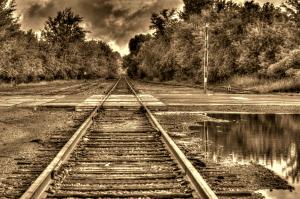Sale on canvas prints! Use code ABCXYZ at checkout for a special discount!

This past Labor Weekend as the rest of Minnesota headed to the cabin or grilled in the backyard I took a somewhat morbid bike ride into the past to a small lake north of Hinckley - Skunk Lake.
On September 1st, 1894, the town of Hinckley, Minnesota was one of four towns in Northern Minnesota obliterated by a firestorm taking the lives of more than 400 people.
Back then Hinckley was a lumber town of 1400 people, where business was booming around a seemingly endless supply of pine trees.
The trees were chopped, stripped of branches and taken to Hinckley to be milled. That logging practice of leaving small branches on the ground to dry out year after year was just one of several factors that came together that day that contributed to a devastating Perfect Storm erupting over the town.
Another was the weather. The summer of 1894 was extremely hot and dry and by September 1st, no rain had fallen in the region for three months. Small fires had erupted and were slowly simmering and smoldering in the undergrowth. Hinckley residents has become used to smoke drifting across the town from "nuisance" fires and went about their day as usual.
Mid-morning on September 1st a slight breeze bought the nuisance fires to life turning them into a cyclonic infernos as they came into contact with each other and unusually cooler air in the atmosphere. The result were two rarely-seen, yet horrifying, walls of flame 200 feet high blowing temperatures of 1600 degrees towards the town, incinerating all in its path.
By the time the people of Hinckley had realized what was about to happen there was no way out - except for a train driven by a man who slammed his burning locomotive into reverse for six miles, saving the lives of some 200 people.
The Saint Paul & Duluth Railroad between the Twin Cities to the south and Duluth to the north rattled through the town several times a day.
On September 1st, engineer James Root was driving his train south from Duluth. As he approached Hinckley he was confronted with a desperate crowd of hundreds of people running along the train tracks, being pursued by a wall of flames. Realizing the train was their (and his) only hope he flung his engine into reverse as people clambered on board. By the time they made it six miles to the north the fire storm had caught up with the train which by then had become engulfed in flames. Mr Root's terror stricken passengers had to abandon their escape path and threw themselves into a lake - Skunk Lake. It was about 4.30 pm.
On September 1st, 2014, the 120th anniversary of the fire, I drove to Hinckley, just over one hour north of Minneapolis. I wanted to find Skunk Lake and stand on the railway line alongside the lake at exactly 4.30pm.
The old railway line is now part of the Willard-Munger State Trail, a series of paved biking trails between Hinckley and Duluth and about six miles north was Skunk Lake. It's an average looking lake, not very big, not very deep. A quiet country road about 500 feet away. There is an understated bench and a sign with a brief history of what took place.
I wandered around the town of Hinckley the day before, clambering over railway lines, looking for some sign or link to the past. I set my camera up on the railway and took some shots of the northbound train tracks.
Some might say it was a somewhat ghoulish way to spend Labor Day, (and they did!). Some, like our beloved editor and chief, Cindy Ackley-Nunn said "Oh My God - that sounds like something I would do!".
I wanted to acknowledge a historic event, I wanted to pay my respects, celebrate those that found sanctuary in one of the 10,000 lakes Minnesota is known for and remember those that didn't. And that was the sad part - on the 120th anniversary I don't think anyone else did remember.
There was no memorial service, no flowers at the memorial and mass grave and very little bike traffic on the trail.
I wonder if it was too horrible to remember, even though those that could remember are long gone. I wonder if it was so long ago and some much has happened since then, multiple wars, depressions, recessions and revolutions.
Hinckley did rebuild. There is a huge casino on the outskirts of town, most likely the town's largest employer. A far cry from the timber yards in their heyday.
There were some positives to come out of the tragedy. Forestry management practices were formed and federal agencies that monitor and fight wildfires were developed.